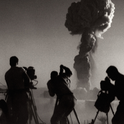Two cheers for communism. It gave us some wonderful books. What now? The Czech scientist and poet Miroslav Holub suggests, in the latest British Council volume of New Writing, that things aren't all bad in the Czech Republic. That's a characteristically superior view. But the question is why the books written under communism were so good, and stand the test of rereading out of season.
Milan Kundera can't be ignored, because he has acquired such a reputation worldwide. But he has always seemed restless about that reputation, barely fictionalising bits of his biography to make a fantastic statement about all our lives. His essays about the novel endorse his concern with laughter and the body as a grand tradition from Cervantes and Rabelais. Faber has published some of them in Testaments Betrayed. It is a volume of mixed quality, with the inevitable Czech writer's essay on Kafka. The literary theory looks second-hand, the literary history self-serving. We should judge him instead on his new novel, Slowness, his first for five years and the first written in French.
Ultra-short and barely a novel, Slowness seems to tell us where a disappointed Kundera (who emigrated to France over 20 years ago) has arrived. The speed-addicted west has already forgotten the fuss it made over communism and has already rendered its dissident heroes redundant. I was reading this confection with difficulty when I heard a child screaming in the street. That says it all. Slowness is a howl of impotence. Its misery is divided among three figures, one of them Kundera by name, another a French alter ego called Vincent, whose erotic life is as clumsy as his intellectual career, and a third, a Czech scientist restored to his profession after 20 years' manual work. The usual Kunderian psycho-sexual climate, sadistic and unpleasant, predominates, until Vincent fails to copulate beside the hotel pool. Then Kundera's universe collapses. The Great Chain of Couplings falls mercifully slack. Perhaps one is supposed to laugh, though I would not wish this ineffective, squirming French life on anyone.
The character called Kundera, lying chaste and fretful beside his wife in the same hotel, is left to dream. He invents an 18th century liaison dangereuse written by a Vivant Denon. Not only does the sex go better in dreams, but we meet "Vivant de non" who lives by saying no-specifically, no to pain as a way of life. The centrepiece of Slowness is thus an excursion into Epicurus, with de Sade, patron saint of a kind of pleasure, glowing in the penumbra. Kundera's gloss is that we must uphold pleasure, even lie to ourselves and each other, to promote happiness. He is a Nietzschean with regard to the need at any cost to make a work of art of one's life. As a thinker, he seems to have taken his identity from a book of de Sade's called The Philosopher in the Bedroom.
His meanings suffer, torn from the communist context. (This is what Kundera would expect western critics to say, but it seems to be true.) In the old days, it made rebellious good sense to extol sensual pleasure and humour in the face of stony pseudo-scientific officialdom. Kundera jolted us by observing how the humiliation, dishonesty and forgetfulness which characterised official communist life also barbarised personal relationships everywhere. But now his counter concepts of laughter, lightness, slowness, forgetting, seem factitious. Something about the form of the novels no longer works either. Where the discontinuous, jocular, self-conscious narratives paid tribute to surrealism, to modernism, and again to Nietzsche, and where all of those aesthetic modes made communism look ridiculous, and recalled artistically more sophisticated Czech pre-war culture, now the sketchy texture merely seems unsatisfying. Life is more complex, worth more, than Kundera's pages suggest. And does western life cultivate speed in order to forget? The very title of Slowness is off centre, for the book's real theme is a man who believes he's made it, then realises he has only made himself laughable. Self-pity? Self-degradation?
Whatever it is, it's not entertaining. Harold Bloom in The Western Canon suggests, fairly enough, that we shall remember Kundera for The Unbearable Lightness of Being. Meanwhile, the writer who really did capture communist reality is Ivan Klima, the only important Czech novelist who did not emigrate. Klima might have surfaced anywhere in the world as a love poet in prose, but his particular business has been to portray unpredictable, sometimes redeeming love alongside the garbage of the communist world. Against Kundera it might be said that Klima's vignettes of displaced life in Love and Garbage (1986) and My Golden Trades (1988) are not just posturing exhortations to remember the detail of 40 terrifying years, but real places where the reader's memory feeds. We remember the banned writer who gets a job sweeping up trash; we recall an old morgue-dwelling farmer whose observations are burnt by an embarrassed, politically conforming priest. Klima's official Czechoslovakia in the 1980s had given up the ghost. Its culture was rubbish, its lands poisoned. His metaphors remain our best guide to how life used to be. They take us from the environmental pollution to the less visible decline of the mind. Tortured by intellectual pollution, Kundera invented those now redundant counter-communist concepts. Meanwhile, Klima wrote a third novel in the mid-1980s, Judge on Trial. This realist epic has not dated. Between its lines I have not read a better explanation for why central European literature had to take over the subverted roles of law and philosophy. Klima's protagonist, Adam Kindl, is the child in all of us, wanting fair play. Given a murderer to defend, he faces a dilemma, believing that a corrupt justice system has no right to condemn anyone. The case, handed to him by suspicious superiors, is an invitation to self-destruction, and the ploy works.
The book is a depressing, gripping monument to the equivocations of middle class life anywhere. The corrupt system throws moral responsibility on to individuals, who then realise their weakness. Kindl, child of the Enlightenment, studied Kant and believed in Reason. His personal idea collapsed, just as communism distorted and collapsed the dream of the rational state. In the figure of Adam Kindl there is thus a kind of sympathy towards the original moral inspiration for what became communism. Which brings us to communism's last years and the difficult business of disowning it.
As all the Czech writers emphasise, supporters and critics of officialdom enjoyed the same education. Both sides read Schiller and Goethe and Kant and listened to Beethoven. They were educated in the milieu out of which History and Progress sprang. They went on to read the French and Russian novelists. Kundera in his early novels, and Ludvik Vaculik in his chronicles A Cup of Coffee with My Interrogator, show how life gradually and often accidentally pushed people on to opposite sides. Those who struggled to keep alive the old pre-communist European tradition knowingly drew on the same cultural resources which helped to mould the communist world in the first place. Subtle distinctions and reinterpretations constantly had to be made. Kundera has often reanimated literary history in his libertine spirit. Goethes and Lermontovs, Pushkins and Hemingways stalk through his work. The great European tradition became divided, went underground, was squandered or adulterated, but that the base was still there was shown by Vaclav Havel's masterly reworking of Goethe's Faust theme in his play Temptation. (At the 1986 Stratford premiere the audience stamped its wild approval of this play.) Writers took over the guardianship of literary history, criticism and philosophy because it mattered to keep in touch with European cultural roots. The resulting literature has a strength comparable to Russian literature in the 1920s, when attacks on Bolshevism in the spirit of cosmopolitan humanism were still possible. Then, too, there was a fashion for Kant, and Mikhail Bakhtin was writing essays on laughter and the body in the novel after Cervantes and Rabelais.
The enduring problems of a philosophy which went wrong, of conscience under impossible pressure, and individual survival in jeopardy, inform the work of the greatest writer to emerge from communist Europe, Christa Wolf. Her novel No Place on Earth fictionalises a chapter in literary history. The date is 1804: after Kant, Goethe and the French revolution, during the occupation of Napoleon and the rise of a simplistic faith in universal scientific explanation. Hegel and Marx seem namelessly to portend in the atmosphere of this story, in which two young writers look and fail to find a place for themselves on earth. Kleist, having read Kant, feels he can never have true knowledge and has abandoned his studies. G?nderrode is a poet who sees too much; she sees behind the pretence of life to the levers which work it. The new world courts the perfectability of man, yet the moment when that might have been possible, in Goethe, seems already to have receded. Kleist and G?nderrode, both historical suicides, sense the world, intellectually, going into reverse. They feel oppressed-and objectively they are, for the Corsican stands behind every door. Everyone has an untellable secret. Poets perceive the stifling separateness of people from each other. Individuals often have no choice but to commit wrong. Friends cannot be honest with each other. It is impossible to resist all evil, though the spirit rebels.
No Place on Earth is an allegory of Wolf's time and of the whole history of modern ideas, from that moment when science and imagination parted company. Science is interpreted as a crushing power. The theme-gently stated, violently and romantically felt-is of the soul trapped in a totalitarian conformity, from which it does not have quite the strength to escape. How can critics say that Wolf kept silent through the dark years? Her books demand a period of silence after reading. Their power is great.
Likewise a unique book by the Hungarian Gyorgy Konrad, The Case Worker. It is as if the keeper of Kafka's castle were speaking. A middle class communist's life is turned upside down when he falls in love with a feral child and tries to nurse it back into the civilised community. The writing is so lustrous with the tangible objects of life that even filth seems to radiate its own beauty. Konrad's more recent The Feast in the Garden re-tells with great verve the story of the postwar communist generations. It consolidates the world according to Epicurus, the philosopher in the garden, but without Kunderian lies.
Common themes emerge. Central European writing has continually reanimated literary history and revisited philosophers. It has depicted too many suicides, while remembering in banal detail the war, the Holocaust, and the purges. The ease with which it was possible to slip into evil convention, whether of Nazism or of communism, is the stuff of its pages, alongside love and gardening. I mean the kind of gardening practised by Epicurus, the good husbandry of body and soul. In the garden one grows suspicious of language and wary of the capacity to forget. Polish writers, notably Kazimierz Brandys and Tadeusz Konwicki, have written powerfully on all these themes: Brandys in A Question of Reality and A Warsaw Diary; Konwicki in A Minor Apocalypse and A Dreambook for our Time. Both, more disturbed as Poles by their closeness to Russia, are consciously philosophical writers, fictionalising their daily lives and thoughts. The result, with Brandys, are books not entirely successful as novels.
Konwicki stares at the end of the era:
I am not especially happy that the experiment begun by two German scholars has ended in fiasco. I find it no occasion for joy that suddenly newly victorious Private Initiative has been resurrected from its shallow grave along with its progeny, Selfishness and Greed. How good that communism will lose. What a shame that communism will lose.
After the velvet revolution, disillusion quickly replaced the moral excitement of freedom. Ivan Klima's Waiting for the Darkness, Waiting for the Light (1994) features a vacillating, average sort of man-the kind Vaclav Havel has always depicted in his plays-who seems particularly intelligible to the British. The citizen of late communism may claim to be temporarily ill-prepared to rejoin Europe, but he looks more like the human being eternally ill-suited to meet the moral demands of freedom. He who longed for artistic freedom ends up making porn films. This disillusion comes both from watching people, and drawing closer to the west. When Europe reunited it was clear that civilisation had been unravelling in the west too, hence Konwicki's and Klima's ambivalence.
Danilo Kis died young, when Yugoslavia was just still intact. But any thought of the fate of central European literature must include him, because of his remarkable modernist work, A Tomb for Boris Davidovich (1976), which shows that already in Yugoslavia's beginning was its destined end. The Bosnian war finally shot to pieces the Enlightenment ideal of a rational humanity obedient to one moral law. Now that ex-Yugoslavia is redividing, it even looks as if that country was better off under its version of communism. Communism was ghastly, but whatever the system, the real moral problem has always been the human being. The central European contribution has created a literary-philosophical tradition we can all build on, while staring our shared legacy of a troubled post-Enlightenment culture in the face.











